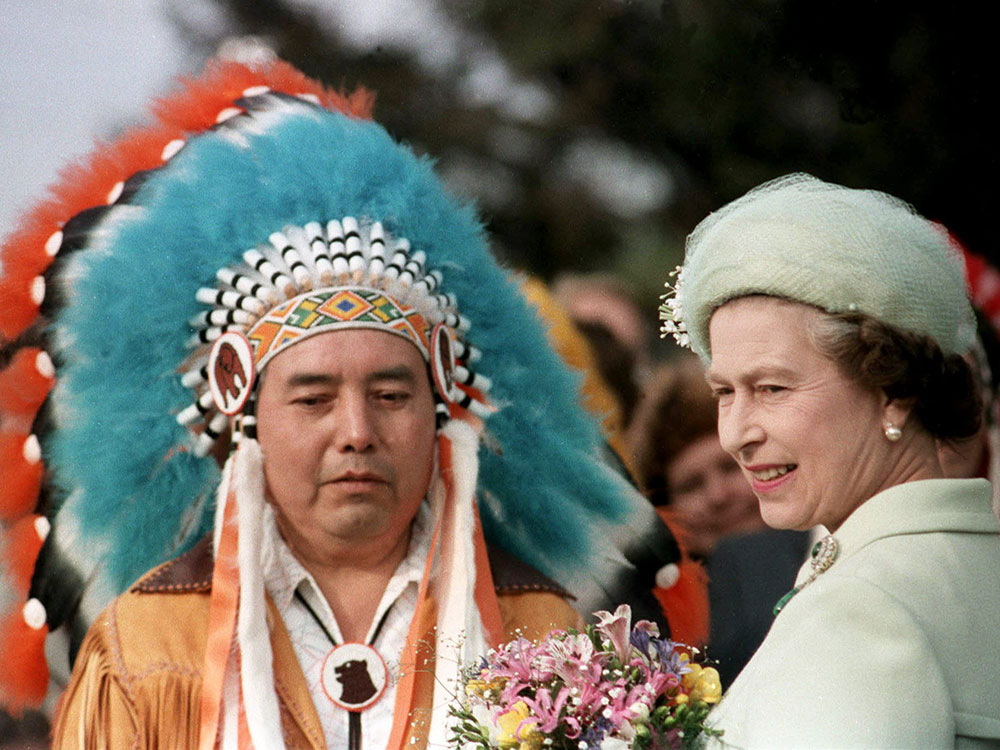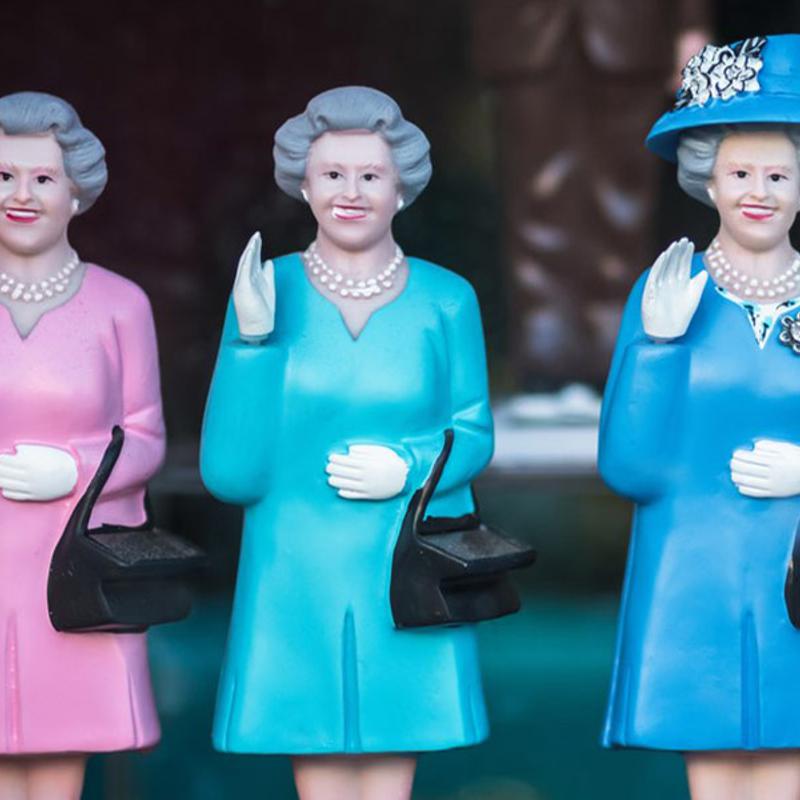After Elizabeth: Unpopular Heirs and a Changed Canada
Politicians face tough decisions on the role of the monarchy.
8 Sep 2022
The Conversation
Thomas Klassen is a professor in the school of public policy and administration at York University. This article originally appeared in the Conversation.

Thomas Klassen is a professor in the school of public policy and administration at York University. This article originally appeared in the Conversation.

Chief Wellington Staats of the Six Nations Council of the Mohawks
and Queen Elizabeth II in 1984.
Photo by Mike Blake for the Canadian Press.
The death of Queen Elizabeth, the longest reigning monarch in British history, marks the end of an era for Canada.
Elizabeth witnessed the opening of the St. Lawrence Seaway in 1959, the expansion of Canada’s social programs in the 1960s, the Quebec referendums in 1980 and 1995, free-trade agreements with the United States and father-and-son prime ministers. In 1982, she signed the proclamation that repatriated the Constitution, ending the role of the British Parliament in Canada’s affairs.
During her long reign, Canada became dramatically less anglophone and anglophile. Nearly half of Canadians were of British ancestry when she assumed the throne in 1952, but that decreased to one-third in 2016 and continues to decline.
In the 1950s, high-school students across English Canada waved the Union Jack, sang the royal anthem (“God Save the Queen”), said the Lord’s Prayer and cheered cadet corps dressed in British khaki. Elizabeth saw the replacement of the Union Flag by the Maple Leaf in 1965, and the royal anthem by “O Canada” in 1980.
Over seven decades, Elizabeth successfully transitioned from embodying the key traditions and beliefs of many to a warmly regarded, but not particularly significant, figure in the lives of Canadians. She remained personally popular in Canada, although she spent relatively little time (about 200 days) in the country over visits that averaged once every three years.
Her dedication to the job as monarch was viewed favourably, as was the absence of scandal in her personal life. She harnessed goodwill from Canadians mostly as an individual, rather than as the hereditary head of an institution while acting as a living link to Canada’s days as a colony in the British Empire.
The unpopular heir
A poll on her performance, conducted in 2020, found eight in 10 Canadians believed that the Queen has done a good job in her role as monarch.
But the poll also found that half of Canadians agree that the country should terminate formal ties to the monarchy after the end of Elizabeth’s reign.
And a more recent poll in 2021 found that only one in five Canadians want to see Prince Charles become king , while only one in three would like Prince William to ascend to the throne.
Elizabeth’s successors — Charles, whose time as king given his age of 73 will be relatively short, and William, who will follow — assume the job at a different time in Canada’s history.
Charles takes on the job as head of state for a Canada almost unrecognizable from what the country was in 1952 in terms of the role of religion in the lives of its citizens, the diversity of its inhabitants and its geo-political relations.
Prime Minister Justin Trudeau has been carefully non-committal on the future of the monarchy. In March 2021, he said: “If people want to later talk about constitutional change and shifting our system of government, that’s fine. They can have those conversations.”
With a minority government, he may be hesitant to spend political capital on constitutional reform.
The public’s mood

Should Canada Ditch the Monarchy? READ MORE
On the other hand, prime ministers are opportunists. The transition to a new monarch — an event that has not occurred in the lifetime of the vast majority of Canadians — is an occasion to gauge the mood of the public and review existing arrangements.
The constitutional file has a special appeal for politicians looking to create or cement a legacy. Pierre Trudeau’s defining triumph was repatriating the Constitution.
Elizabeth’s great accomplishment, aided by genes that allowed an extraordinarily long and healthy life, was to keep at bay discussions of the future of the monarchy in Australia, New Zealand and the other former British colonies of which she was the head of state. Her death will permit debate and deliberation to start.
As many Canadians mourn the passing of the Queen, they should also reflect on the continued relevance and meaning of the monarchy in a nation reconciling with its colonial past and seeking its place on a complex global stage.
The death of Queen Elizabeth, the longest reigning monarch in British history, marks the end of an era for Canada.
Elizabeth witnessed the opening of the St. Lawrence Seaway in 1959, the expansion of Canada’s social programs in the 1960s, the Quebec referendums in 1980 and 1995, free-trade agreements with the United States and father-and-son prime ministers. In 1982, she signed the proclamation that repatriated the Constitution, ending the role of the British Parliament in Canada’s affairs.
During her long reign, Canada became dramatically less anglophone and anglophile. Nearly half of Canadians were of British ancestry when she assumed the throne in 1952, but that decreased to one-third in 2016 and continues to decline.
In the 1950s, high-school students across English Canada waved the Union Jack, sang the royal anthem (“God Save the Queen”), said the Lord’s Prayer and cheered cadet corps dressed in British khaki. Elizabeth saw the replacement of the Union Flag by the Maple Leaf in 1965, and the royal anthem by “O Canada” in 1980.
Over seven decades, Elizabeth successfully transitioned from embodying the key traditions and beliefs of many to a warmly regarded, but not particularly significant, figure in the lives of Canadians. She remained personally popular in Canada, although she spent relatively little time (about 200 days) in the country over visits that averaged once every three years.
Her dedication to the job as monarch was viewed favourably, as was the absence of scandal in her personal life. She harnessed goodwill from Canadians mostly as an individual, rather than as the hereditary head of an institution while acting as a living link to Canada’s days as a colony in the British Empire.
The unpopular heir
A poll on her performance, conducted in 2020, found eight in 10 Canadians believed that the Queen has done a good job in her role as monarch.
But the poll also found that half of Canadians agree that the country should terminate formal ties to the monarchy after the end of Elizabeth’s reign.
And a more recent poll in 2021 found that only one in five Canadians want to see Prince Charles become king , while only one in three would like Prince William to ascend to the throne.
Elizabeth’s successors — Charles, whose time as king given his age of 73 will be relatively short, and William, who will follow — assume the job at a different time in Canada’s history.
Charles takes on the job as head of state for a Canada almost unrecognizable from what the country was in 1952 in terms of the role of religion in the lives of its citizens, the diversity of its inhabitants and its geo-political relations.
Prime Minister Justin Trudeau has been carefully non-committal on the future of the monarchy. In March 2021, he said: “If people want to later talk about constitutional change and shifting our system of government, that’s fine. They can have those conversations.”
With a minority government, he may be hesitant to spend political capital on constitutional reform.
The public’s mood

Should Canada Ditch the Monarchy? READ MORE
On the other hand, prime ministers are opportunists. The transition to a new monarch — an event that has not occurred in the lifetime of the vast majority of Canadians — is an occasion to gauge the mood of the public and review existing arrangements.
The constitutional file has a special appeal for politicians looking to create or cement a legacy. Pierre Trudeau’s defining triumph was repatriating the Constitution.
Elizabeth’s great accomplishment, aided by genes that allowed an extraordinarily long and healthy life, was to keep at bay discussions of the future of the monarchy in Australia, New Zealand and the other former British colonies of which she was the head of state. Her death will permit debate and deliberation to start.
As many Canadians mourn the passing of the Queen, they should also reflect on the continued relevance and meaning of the monarchy in a nation reconciling with its colonial past and seeking its place on a complex global stage.

Do You Think Canada Should Cut Ties with the Monarchy?
Please note that Tyee Barometer polls are only intended as a quick and engaging non-scientific snapshot of our readers’ opinions on various topics that fit with The Tyee’s very broad editorial mandate. They are not intended to be seen as a representative sampling of BC opinion.Queen Elizabeth II, the longest reigning monarch in the history of the U.K., has died.
Over the course of her 70-year reign, the Queen became a familiar wallpaper to Canadian national consciousness. Officially our head of state and a striking symbol of our colonial identity, she was also, for many, an increasingly quizzical figurehead. For now, she remains embossed on our coins.
Now that she’s been instantaneously swapped with King Charles III, and the U.K. reckons with the ramifications of what this means for the selfhood of the former empire; Indigenous people and settlers continue to shine light on the context here. Many people in Canada are now saying its officially time to cut ties with the monarchy.
Forty years after the British Parliament officially stopped overseeing our affairs, many say the end should have come much sooner. With this in mind, we want to ask:
Do you think Canada should cut ties with the monarchy?
* Please note that all poll answers will be publicly viewable, but anonymous.
No comments:
Post a Comment